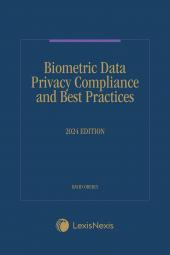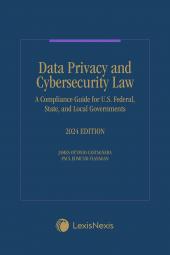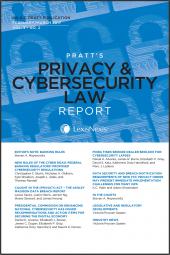Biometric Data Privacy Compliance and Best Practices
Select a format
 International Order Inquiry
International Order Inquiry
Select subscription type
Terms & conditions
Subscribers receive the product(s) listed on the Order Form and any Updates made available during the annual subscription period. Shipping and handling fees are not included in the annual price.
Subscribers are advised of the number of Updates that were made to the particular publication the prior year. The number of Updates may vary due to developments in the law and other publishing issues, but subscribers may use this as a rough estimate of future shipments. Subscribers may call Customer Support at 800-833-9844 for additional information.
Subscribers may cancel this subscription by: calling Customer Support at 800-833-9844; emailing customer.support@lexisnexis.com; or returning the invoice marked "CANCEL".
If subscribers cancel within 30 days after the product is ordered or received and return the product at their expense, then they will receive a full credit of the price for the annual subscription.
If subscribers cancel between 31 and 60 days after the invoice date and return the product at their expense, then they will receive a 5/6th credit of the price for the annual subscription. No credit will be given for cancellations more than 60 days after the invoice date. To receive any credit, subscriber must return all product(s) shipped during the year at their expense within the applicable cancellation period listed above.
The total price includes the product(s) listed in the Order Form and any Updates for a limited period (minimum period of 30 days) after the order is placed ("Order Window"). Shipping and handling fees are not included in the grand total price.
All shipments may be returned, at subscribers' expense, for full credit of the Price within 30 days of receipt.
Shipments may not be returned, and no credits will be issued, more than 30 days after receipt.
After the Order Window, subscribers will receive notice of Updates along with the then-current grand total price and order process as Updates become available. Subscribers will only be shipped those Updates they specifically request.
Product description
View a sample of this title using the ReadNow feature
Written by David J. Oberly, one of the nation’s foremost thought leaders in the biometric privacy space, Biometric Data Privacy Compliance and Best Practices is the first and only full-length treatise of its kind to provide a comprehensive compendium of biometric privacy law at all three levels of U.S. government, as well as detailed, practical guidance for developing comprehensive compliance programs in connection with the day-to-day utilization of biometric data in commercial operations.
Just years ago, the thought of being able to unlock your phone with your face, or “punch in” at work using only your fingerprint, seemed like pure science fiction. Fast forward to today, and biometric data is now heavily relied upon in a range of different commercial contexts to enhance the efficiency, effectiveness, and security of business operations in a number of ways.
The use of biometric data provides companies across all sectors with a myriad of benefits, including enhancements to the consumer experience, convenience, security, and fraud reduction—just to name a few. At the same time, biometric data also presents a unique set of challenges, particularly in the areas of privacy, security, transparency, and discrimination/bias.
More than that, the use of biometrics today also exposes companies to notable legal risks and particularly outsized liability exposure. Due to concerns regarding the collection, use, and storage of biometric data in a safe and responsible manner, lawmakers across the United States have sought ways to strictly regulate the commercial use of biometric technologies. Already, several states and municipalities have enacted laws that place stringent requirements and limitations over the collection and use of biometric data. To further complicate matters, states and cities from coast to coast—as well as federal lawmakers on Capitol Hill—have made it a top priority to enact additional strict laws regulating the use of all forms of biometrics.
The biometric privacy legal landscape is uncertain and ever-evolving, and requires companies and their counsel to navigate an increasingly-complex patchwork of varying laws and regulations. As time progresses, nature and scope of legal risks associated with biometric data will continue to trend upward. As such, it is essential for companies that use, or intend to use, biometrics in their operations to embrace a proactive stance to compliance by implementing strategic risk management measures to mitigate the immense liability exposure inherent in the use of facial, voice, fingerprint, and similar types of biometric technologies.
Biometric Data Privacy Compliance and Best Practices is complete with charts and checklists. This definitive, authoritative legal guide is the go-to tool for navigating the rapidly-changing biometric privacy landscape, managing legal risks, and mitigating liability exposure when attempting to leverage the benefits of biometrics in the commercial arena—and an invaluable resource for corporate c-suite executives, in-house legal teams, outside counsel, and compliance personnel.
eBooks, CDs, downloadable content, and software purchases are noncancelable, nonrefundable and nonreturnable. Click here for more information about LexisNexis eBooks. The eBook versions of this title may feature links to Lexis+® for further legal research options. A valid subscription to Lexis+® is required to access this content.
Table of contents
Chapter 1 Background on Biometrics
Chapter 2 Illinois Biometric Information Privacy Act
Chapter 3 Texas Capture or Use of Biometric Identifiers Act
Chapter 4 Washington HB 1493
Chapter 5 Municipal-Level Biometrics Laws
Chapter 6 Employment-Specific Biometrics Laws and Considerations
Chapter 7 Federal Trade Commission Facial Recognition Enforcement
Chapter 8 Artificial Intelligence
Chapter 9 Consumer Privacy Law Treatment of Biometric Data
Chapter 10 Looking Ahead by Looking Back: Review of 2022 Proposed Biometrics Legislation
Chapter 11 Compliance Tips
 Lexis Nexis
Lexis Nexis 


